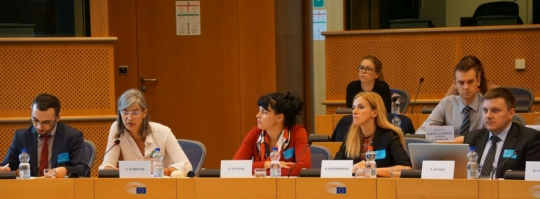Here are some statements made by Olha Kotsiuruba
Introduction of a proportional representation electoral system
Substitution of mixed electoral system with open-list proportional representation system is one of the key aspects of the electoral reform. The Venice Commission and Parliamentary Assembly of the Council of Europe have been recommending the proportional representation electoral system since 2012.
A draft law, which introduces proportional representation electoral system, had passed the first reading in the Parliament.
The draft law on the Election Code is based on the bill, developed yet in 2010. Most of the regulations, particularly those concerning voter registration, electoral funds and appeal procedures, are out-of-date and not in line with current legislation. Besides that, the draft law does not provide a special procedure for distribution of mandates, – the number of elected MPs in a district equals the voter turnout, but not the total number of registered voters. Thus, the draft law requires a fundamental reconsideration.
The last, but not least, there is no majority in the Parliament today, which would support the proportional representation electoral system and this draft law on the Election Code.
Harmonization of election legislation
If a new Election Code is not adopted, the current legislation should be at least harmonized. Today, three electoral laws regulate the same electoral procedures differently. Besides that, there is no effective regulation of political campaigning, campaign financing, vote count and formation of election commissions.
Reforming the election administration body
12 of 15 members of the Central Election Commission have had their seven-year term of office expired 4 years ago, and one more member of the CEC – in February 2017. Re-appointment of CEC members is a vital step towards confident and independent CEC. To be independent and in line with the Venice Commission's Code of Good Practice in Electoral Matters, the future CEC should have at least one representative of each parliamentary faction among its members.
The Parliament approves CEC's membership upon submission of candidates by the President. However, none representatives of the Opposition Bloc are included in the President's submission. Besides that, the President have submitted 14 candidates for 13 seats, what makes representatives of the AUU Batkivshchyna fear that the parliamentary majority will not support their joint candidate. The CEC should get a new membership before 2019 presidential election.
Efficient punishment for violation of electoral legislation and efficient investigation of offenses
A big number of electoral violations and no prosecution make the public loose its trust in the election process. According to a poll, financed by the Council of Europe (with OPORA's expert assistance), which was published in 2017, proves that 68% of respondents are not satisfied with fairness of elections in Ukraine, and only 19% are satisfied. Only 16% of citizens are ready to report a bribe to law-enforcement bodies. According to a poll, conducted by OPORA, there is little hope that individuals, responsible for falsifications, will be brought to liability.
OPORA's experts and the Ministry of Internal Affairs have jointly developed the Draft Law on Making Amendments to Some Legislative Acts Aimed to Strengthen Liability for Violation of Electoral Legislation (#8270). It provides opportunity for investigation and collection of evidence of falsification. Besides that, the draft law introduces liability for the bribery of voters and candidates.
Recommendations
- International community should insist on the introduction of proportional representation electoral system in Ukraine.
- International community should promote the adopting a law introducing sanctions against electoral crimes.
- International community should demand reappointment of new CEC membership based on a proportional representation of parliamentary factions.
